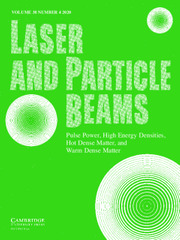Article contents
Laser produced thin metallic planar mini-flyer generation using fiber optic plate
Published online by Cambridge University Press: 09 May 2013
Abstract
Laser produced planar mini flyer generation has widely gained importance owing to its wide ranging applications in the field of condensed matter, astrophysics, material research, shock phenomenon, etc. Flattop smooth laser beam profile as driver is the primary requirement for planar flyer generation besides special multilayered target geometry. We present here laser produced thin metallic planar mini-flyer generation using a fiber optic plate (FOP) of 8 mm thickness and about 6 µm fiber dimension. This technique is unique in the sense that it doesn't require large length as compared to optical fiber. A Gaussian shape laser beam from a laser oscillator was allowed to fall on the FOP generating a speckle pattern. This pattern was relayed and amplified using lenses and laser amplifiers to achieve energy of about 400 mJ. The beam was focused on a substrate (fused silica) based multilayered target on which flyer disks of different materials such as Al. Cu, Br, and Ta were attached. Velocities as high as 400 m/s was measured for Al flyer of 1.5 mm diameter and thickness 50 µm. Flyer disks were completely recovered after the laser shot. We also present a theoretical analysis along with experimental results of the laser beam smoothing technique using a He-Ne laser and FOP. Each channel of the FOP acts as a small single mode optical fiber. The basic idea was to divide the incoming coherent beam into many beam-lets introducing random distribution in length or/and diameter of optical fibers of FOP. The individual FOP channel acts as a diverging source because of single mode fiber with natural divergence λ/d. However, due to the small randomness in length or diameter, the individual diffraction sources are not in phase. This results in the generation of speckles in both near (Fresnel) and far field (Fraunhoffer) destroys the spatial coherence of the beam.
- Type
- Research Article
- Information
- Copyright
- Copyright © Cambridge University Press 2013
References
REFERENCES
- 3
- Cited by


